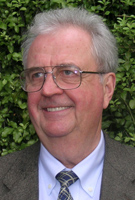
Joseph Cerny, a distinguished member of the UC Berkeley Chemistry faculty and a Berkeley Lab senior staff member for more than five decades, died on April 17, 2024, after a long illness. Cerny’s distinguished scientific career included the first identification of two new modes of radioactive decay, for which he received the EO Lawrence Award in 1974 and the Nuclear Chemistry Prize of the American Chemical Society in 1977. As an administrator, Cerny held important positions on the UC Berkeley Campus and at the Berkeley Lab. On campus, he chaired the Chemistry Department from 1975-80, and was Dean of the Graduate School from 1986-2000. Concurrently, he served first as Provost and then as Vice Chancellor for Research. At Berkeley Lab, Cerny was Associate Director and head of the Nuclear Science Division from 1980-85.
Joseph (Joe) Cerny was born in Oxford, Mississippi, on April 24, 1936. He graduated with a BS degree in chemical engineering from the University of Mississippi in 1957 and then spent a year in the UK at the University of Manchester as a Fulbright Scholar before entering graduate school in the UC Berkeley Chemistry Department. His thesis research was conducted at the 60-Inch Cyclotron on the UC Berkeley Campus with Bernard Harvey as his advisor.
Upon completion of his PhD in 1961, Joe was appointed assistant professor, the start of a 52 year career as a faculty member in the Department of Chemistry at UC Berkeley. He also launched an independent research program at the Lawrence Radiation Laboratory (now the Lawrence Berkeley National Laboratory, or Berkeley Lab). During the Cuban Missile Crisis, Joe, who was a reserve Army Officer, spent one and a half years engaged in munitions research. Upon his return to Berkeley, he continued his research on exotic decays of proton-rich light nuclei using the newly-commissioned 88-Inch Cyclotron at Berkeley Lab. Joe also collaborated with Art Pozkanzer and Earl Hyde on studies of neutron-rich light nuclei using high energy proton beams at the Bevatron. In June 1978, Joe and Art reviewed the highlights of this field in an article on exotic light nuclei in Scientific American.
This phase of Joe’s career was recognized by the Ernest Orlando Lawrence Memorial Award of the Atomic Energy Commission (predecessor of the U.S. Department of Energy) in 1974, for his “discovery of proton emission as a mode of radioactive decay, for investigation of the limits of nuclear stability of a number of light elements, and for ingenious instruments that made these discoveries possible.” A few years later, in 1977, he was awarded the Nuclear Chemistry Prize of the American Chemical Society for this work and for the discovery of beta-delayed proton emission.
Starting in 1974, Joe accepted a series of important leadership positions that would occupy a significant fraction of his energies for the next quarter century. On campus, he was appointed chair of the UC Berkeley Chemistry Department from 1974-1979. He was then appointed as associate director and division head of Berkeley Lab’s Nuclear Science Division from 1979 to 1985. Following a sabbatical leave at GSI Helmholtz Centre for Heavy Ion Research in Darmstadt, Germany, Joe returned to the UC Berkeley Campus as dean of the Graduate School and Provost in 1986. In 1994, the Provost’s responsibilities were broadened and he became Vice Chancellor for Research, continuing in this role until 2000.
Joe maintained his research group at the Lab, as well as his interest in ingenious instrumentation, throughout his years as a senior administrator on campus. At his 60th Birthday Symposium in 1996, Joe proposed the construction of a beamline to bring unstable nuclei from a medical cyclotron at the laboratory down the hill to the 88-Inch Cyclotron, for reacceleration. This was successfully completed three years later, allowing some of the first experiments with accelerated beams of unstable isotopes.
With his background in university teaching and research, it is no surprise that Joe was a strong advocate for educating the next generation of nuclear scientists, and he led an important study of this topic for the Department of Energy and the National Science Foundation in 2004.
Joe is survived by his sons, Keith and Mark, and four grandsons, from his marriage to Barbara Shirley. He is also survived by stepchildren and step-grandchildren from his marriage to Susan Dinkelspiel Cerny.
Friends and colleagues of Joe’s are invited to an informal Memorial Gathering at the UC Berkeley Faculty Club on Sunday, June 23rd. Guests are invited from 2:00 p.m. onwards with a 2:30 p.m. start. Light refreshments will be served. Please RSVP to Joe’s daughter-in-law, Jennifer Cerny, at jennifermcerny@gmail.com for further details and parking instructions.